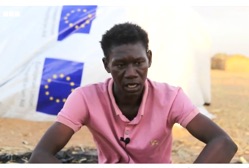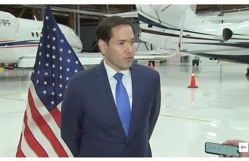As Sudan Spirals Out of Control, Rubio Says US Is Trying to Stop the Slaughter
Suzanne Bowdey-Commentary : Nov 14, 2025
The Washington Stand
"In my entire career, I have never seen a level of violence against an area like we are seeing now." -Nathaniel Raymond, executive director of Yale University's Humanitarian Research Lab
 [WashingtonStand.com] While the rest of the world sees the terror in Sudan from fuzzy satellite images, the real pictures are etched on the minds of the survivors like physical scars. As more people crawl the 40 miles to safety in Tawila, the sickening story of what's unfolded in El Fasher since October 26's siege is almost too gruesome to imagine. One man, who escaped the killing ground that was the local hospital, looks haunted as he explains that he has lost all of his colleagues in the massacre. "It feels as if you lost a big part of your body or your soul," Ahmed admits. (Screengrab image: via BBC)
[WashingtonStand.com] While the rest of the world sees the terror in Sudan from fuzzy satellite images, the real pictures are etched on the minds of the survivors like physical scars. As more people crawl the 40 miles to safety in Tawila, the sickening story of what's unfolded in El Fasher since October 26's siege is almost too gruesome to imagine. One man, who escaped the killing ground that was the local hospital, looks haunted as he explains that he has lost all of his colleagues in the massacre. "It feels as if you lost a big part of your body or your soul," Ahmed admits. (Screengrab image: via BBC)
When the Rapid Special Forces (RSF) broke down the barriers and flooded the city, overwhelming the Sudanese military, he was working as a lab tech when shots started ringing out across the compound. "There was a state of terror, and as we walked, drones were bombing us. And heavy artillery too. I saw many people die on the spot. There was no one who could save them," Ahmed told the BBC. Almost every doctor, nurse, and patient was slaughtered. A handful, he explains, were kidnapped for ransom. Others were lined up and executed. His own sister and two brothers were murdered—and his parents, like so many from El Fasher, are still missing. "They may be killed," he conceded emotionally. "And they may be used as human shields against the airstrikes."
RSF's control of the city, now in its third week, has only deepened the communications blackout. "The true scale of the crisis," the United Nations warns, "is likely far worse than reported." Even the fragile system for delivering aid and relief is "on the brink of collapse," officials admit. The fate of tens of thousands of people, trapped in El Fasher without food or hope, is unknown.
Fortunately, the nightmare has reached the upper echelons of the Trump administration, where Secretary of State Marco Rubio took time out of the G7 Summit in Canada to express his deep concern for the atrocities taking place in the war-torn country. Referring to the ceasefire agreement that the US, Saudi Arabia, UAE, and Egypt were trying to broker with the RSF last week, Rubio wasn't hopeful. "I think the fundamental problem we have is that the RSF agrees to things and then never, never follows through with it. So now, what you have is a calamity on your hands. And so, we've had meetings on this yesterday. We've discussed it multiple times with multiple countries today. And I think something needs to be done to cut off the weapons and the support that the RSF is getting as they continue with their advances."
The humanitarian groups on the ground, Rubio emphasized, "are telling us that some of the levels of malnutrition and suffering that they're seeing from some of these people who have been able to flee is unprecedented. They've recorded things they've never recorded before. And I think even more troubling is that they didn't have the number of refugees they expected to receive—because they assume many of them are either dead or so sick and malnourished they can't move anymore. So what's happening there is horrifying."
While most of the West hasn't been paying attention to the violence in Sudan since its civil war reignited in 2023, the secretary insisted that the US has worked since the summer to stop the fighting, pointing out the other concern, which is that the region "could turn into a nest for jihadist and terrorist activity." But, he stressed, "the solution to it is not to fight a war where civilians literally are being targeted for rape, sexual violence, and murder. And that's what's happening."
 Although most of the fingers point directly at UAE, which is ironically one of the countries America is partnering with to bring down tensions in the region, Rubio was careful not to cast blame. Asked who was supplying the drones that are helping to slaughter civilians, the former senator admitted that they "know who the parties are that are involved" but declined to out them. "I don't want to get into calling anybody out in a press conference today, because what we want is a good outcome here." That said, he continued, "I can just tell you, at the highest levels of our government, that case is being made and that pressure is being applied to the relevant parties. ... This needs to stop." (Screengrab image: via DWS News)
Although most of the fingers point directly at UAE, which is ironically one of the countries America is partnering with to bring down tensions in the region, Rubio was careful not to cast blame. Asked who was supplying the drones that are helping to slaughter civilians, the former senator admitted that they "know who the parties are that are involved" but declined to out them. "I don't want to get into calling anybody out in a press conference today, because what we want is a good outcome here." That said, he continued, "I can just tell you, at the highest levels of our government, that case is being made and that pressure is being applied to the relevant parties. ... This needs to stop." (Screengrab image: via DWS News)
The reality is, "a lot of players" are involved in Sudan, Rubio wanted people to know. If you look at "what the RSF has done in recent weeks, they don't have manufacturing capability [for it]. Someone's giving them the money and someone's giving them the weapons, and it's coming through some country, and we know who they are, and we're going to talk to them about it and make them understand that it's going to reflect poorly on them, and it's going to reflect poorly on the world, if we can't stop this."
Former Congressman Frank Wolf, a human rights champion who's traveled the world to advocate for religious freedom, could barely believe the reports coming out of Darfur. "There's massive killing, there's rape, there's starvation. You hear stories coming [out] about mothers having to decide what child they want to see live. And so, it's about as horrible as [it] can possibly be." Having traveled to Sudan himself in past years, he knows the nightmarish history these Africans have already lived through. If we want history to stop repeating itself, Wolf urged, the US needs to use every tool at its disposal.
First, he insisted, "It has to be called genocide. Our government has to designate this genocide," Wolf repeated, which would also make anyone involved complicit in the eyes of the world.
Secondly, Wolf argued, "We need to appoint a special UN envoy. And the ideal candidate, he told "Washington Watch" guest host Jody Hice, is "[someone] who's really tough, maybe even a retired military general. ... And then begin to send messages." For instance, he suggested, "The UAE has a number of retired American military officers that are working for [them]. They're not involved in genocide, don't get me wrong, but they're helping them on weapons and arms and things like that. They should be told they have to come home. They cannot go there without the approval of the Defense Department. They should be told they have to come home until the UAE stops aiding and sending weapons to RSF."
Also, the former congressman pointed out, America is supposed to have a good relationship with Saudi Arabia, but the Saudis "are helping the other side. Egypt's helping the other side. ... Turkey's involved. And the fighting has gone on for two years. The numbers of death are ... thousands upon thousands." No American generals should be working with them either until this is resolved, he reiterated.
And then there's the cultural leverage. "The NBA's there," Wolf underscored about these Middle East nations. "They have tournaments there. They should be told no tournaments in the UAE" until they stop sending weapons to the RSF.
Other options, one of which was brought up to Rubio and has been proposed by a handful of senators, include designating the RSF a foreign terrorist organization. "It would be helpful in bringing this to an end," Rubio agreed. "I think, unfortunately, what's happening here is the RSF has concluded that they're winning, and they want to keep going. And by 'going,' ... they're not just fighting a war. [And] war alone is bad enough. They're committing acts of sexual violence and atrocities. Just horrifying atrocities against women, children, [and] innocent civilians of the most horrific kind."
Like most people, the thing that keeps Rubio up at night about Sudan is the missing people. "I can tell you that the one thing that I think was most shocking to us is that they anticipated receiving thousands of refugees [after El Fasher fell], and they didn't. ... And we fear that the reason why they didn't come out is because they're dead, or because they're so sick and so famished that they can't move. ... When the refugees don't come and you know they would otherwise, you have these suspicions that they're either dead or unable or about to die. And that is just what really is weighing on us right now."
The sooner the better, now that RSF troops are regrouping and rearming for an equally bloody clash to the east. Already, Nathaniel Raymond, executive director of Yale University's Humanitarian Research Lab, has warned, "In my entire career, I have never seen a level of violence against an area like we are seeing now."
Ahmed, like so many displaced and grieving people, understands that no matter what happens, he can never go home. "I do not have any hope of returning to El Fasher," he said somberly. "After everything that happened and everything I saw," he paused, adding quietly, "Even if there was a small hope, I remember what happened in front of me." Subscribe for free to Breaking Christian News here
Suzanne Bowdey serves as editorial director and senior writer at The Washington Stand.
